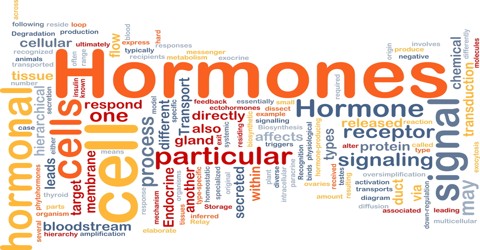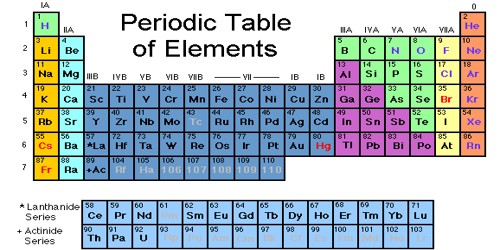About Hormones
Definition
Hormones are chemical substances secreted from endocrine glands directly into the blood. A hormone is a specific molecule that acts as a chemical messenger in the endocrine system. Most hormones are carried by the circulatory system to different areas of the body, where they influence specific cells and organs. Hormones regulate various biological activities including growth; development; reproduction; energy use and storage; and water and electrolyte balance.

Hormones are used to communicate between organs and tissues for physiological regulation and behavioral activities, such as digestion, metabolism, respiration, tissue function, sensory perception, sleep, excretion, lactation, stress, growth and development, movement, reproduction, and mood. Hormones affect distant cells by binding to specific receptor proteins in the target cell resulting in a change in cell function.
Many hormones are secreted by special glands, such as thyroid hormone produced by the thyroid gland. Hormones are essential for every activity of life, including the processes of digestion, metabolism, growth, reproduction, and mood control. Many hormones, such as neurotransmitters, are active in more than one physical process.
Hormones have the following effects on the body:
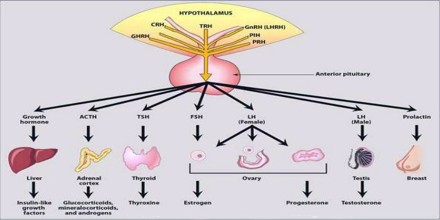
- stimulation or inhibition of growth
- wake-sleep cycle and other circadian rhythms
- mood swings
- induction or suppression of apoptosis (programmed cell death)
- activation or inhibition of the immune system
- regulation of metabolism
- preparation of the body for mating, fighting, fleeing, and other activity
- preparation of the body for a new phase of life, such as puberty, parenting, and menopause
- control of the reproductive cycle
- hunger cravings
- sexual arousal
A hormone may also regulate the production and release of other hormones. Hormone signals control the internal environment of the body through homeostasis.
Regulation of Hormone Production
Hormones may be regulated by other hormones, by glands and organs, and by a negative feedback mechanism. Hormones that regulate the release of other hormones are called tropic hormones. The majority of tropic hormones are secreted by the anterior pituitary in the brain. The hypothalamus and thyroid gland also secrete tropic hormones. The hypothalamus produces the tropic hormone thyrotropin-releasing hormone (TRH), which stimulates the pituitary to release thyroid stimulating hormone (TSH). TSH is a tropic hormone that stimulates the thyroid gland to produce and secrete more thyroid hormones.
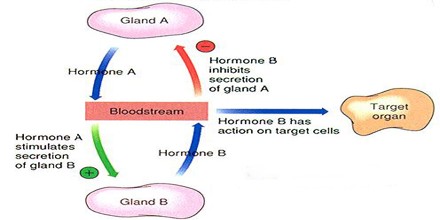
Hormone production and release are primarily controlled by negative feedback. In negative feedback systems, a stimulus elicits the release of a substance; once the substance reaches a certain level, it sends a signal that stops further release of the substance. In this way, the concentration of hormones in blood is maintained within a narrow range. There are three mechanisms by which endocrine glands are stimulated to synthesize and release hormones: humoral stimuli, hormonal stimuli, and neural stimuli.
Hormone secretion can be stimulated and inhibited by:
- Other hormones (stimulating- or releasing -hormones)
- Plasma concentrations of ions or nutrients, as well as binding globulins
- Neurons and mental activity
- Environmental changes, e.g., of light or temperature
Types of Hormones
Hormones can be classified into two main types: peptide hormones and steroid hormones.
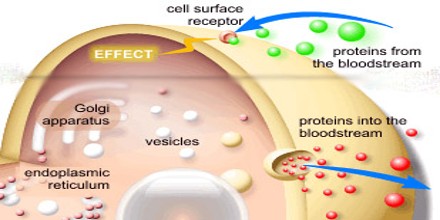
Peptide Hormones: These protein hormones are composed of amino acids. Peptide hormones are water-soluble and are unable to pass through the cell membrane. Cell membranes contain a phospholipid bilayer which prevents fat-insoluble molecules from diffusing into the cell. Peptide hormones must bind to receptors on the cell’s surface, causing changes within the cell by affecting enzymes within the cell’s cytoplasm. The binding of the hormone to the cell membrane receptor initiates the production of a second messenger molecule inside the cell, which carries the chemical signal within the cell. Human growth hormone is an example of a peptide hormone.
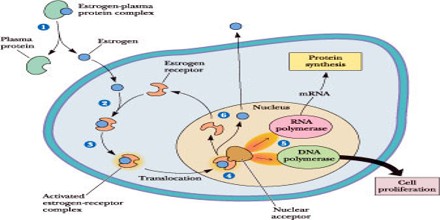
Steroid Hormones: Steroid hormones are lipid-soluble and able to pass through the cell membrane to enter a cell. Steroid hormones bind to receptor cells in the cytoplasm and the receptor-bound steroid hormones are transported into the nucleus. The steroid hormone-receptor complex binds to another specific receptor on the chromatin within the nucleus. The complex calls for the production of certain RNA molecules called messenger RNA (mRNA) molecules, which code for the production of proteins. Sex hormones (androgens, estrogens, and progesterone) produced by male and female gonads are examples of steroid hormones.
